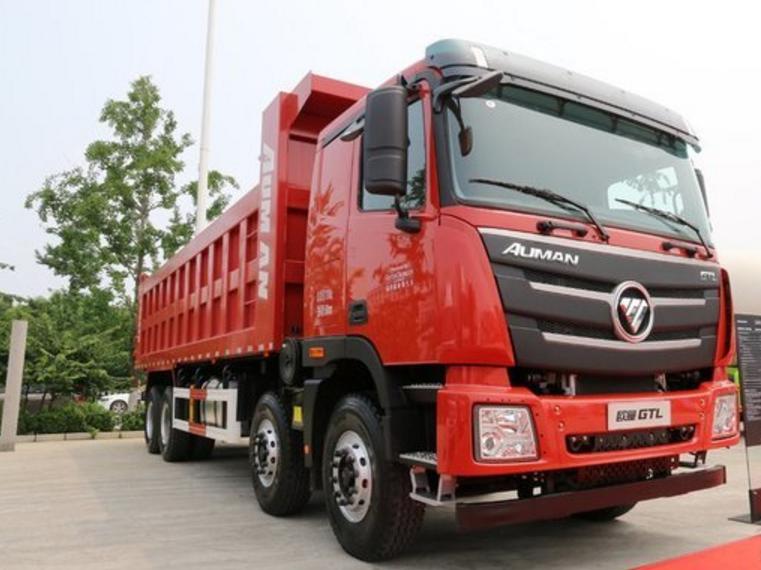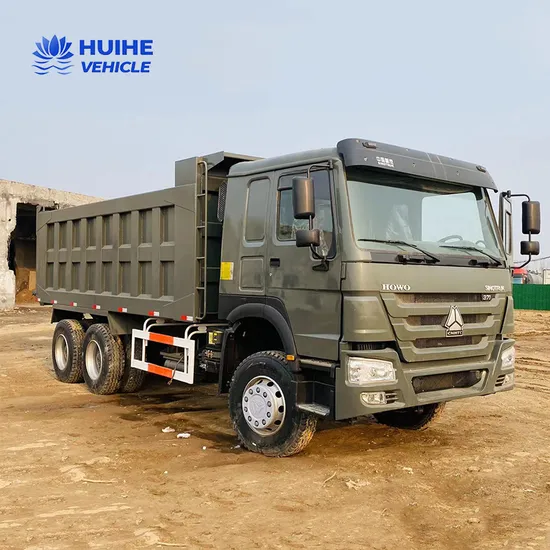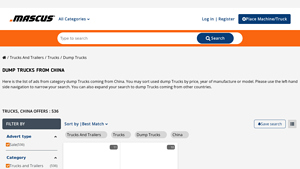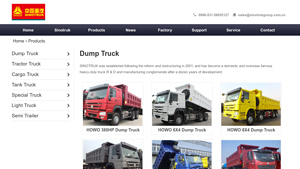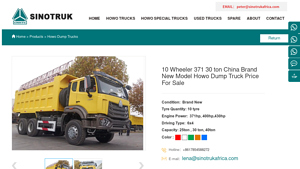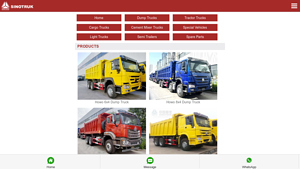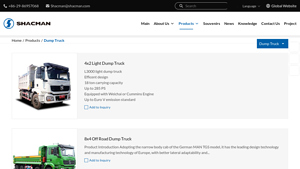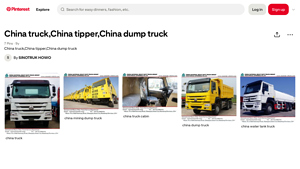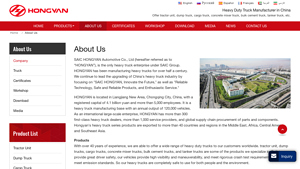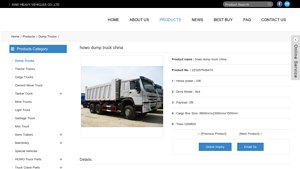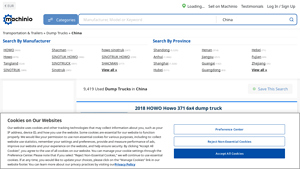Introduction: Navigating the Global Market for dump Truck China
Navigating the complex landscape of sourcing dump trucks from China can present significant challenges for international B2B buyers. With a diverse range of manufacturers and models, understanding the nuances of the Chinese dump truck market is crucial for making informed purchasing decisions. This guide aims to demystify the process by offering a comprehensive overview of the various types of dump trucks available, including specifications, applications, and emerging trends. Whether you are looking for heavy-duty trucks for mining operations in Africa or versatile models for construction projects in Europe, this resource will equip you with the necessary insights to evaluate suppliers, compare costs, and assess quality.
In this guide, we delve into essential aspects of the dump truck market in China, such as supplier vetting processes, compliance with international standards, and the implications of different emission regulations. We also explore the latest innovations in electric dump trucks, catering to the growing demand for eco-friendly solutions. By providing actionable insights and expert recommendations, this guide empowers B2B buyers from regions like Africa, South America, the Middle East, and Europe—including countries like Nigeria and Germany—to make confident, strategic decisions that align with their operational needs and budget constraints. With the right information at your fingertips, you can navigate the global market with ease and secure the best value for your investment in dump trucks.
Understanding dump Truck China Types and Variations
| Type Name | Key Distinguishing Features | Primary B2B Applications | Brief Pros & Cons for Buyers |
|---|---|---|---|
| Heavy-Duty Dump Truck | High payload capacity (20-50 tons), robust construction | Mining, construction, heavy hauling | Pros: Durable, high capacity. Cons: Higher initial cost. |
| Light-Duty Dump Truck | Lower payload capacity (1-10 tons), compact size | Urban construction, landscaping | Pros: Cost-effective, easier to maneuver. Cons: Limited load capacity. |
| Electric Dump Truck | Eco-friendly, lower operating costs, advanced technology | Green construction projects | Pros: Reduced emissions, lower fuel costs. Cons: Higher upfront cost, charging infrastructure needed. |
| Tipper Truck | Hydraulic lift for unloading, versatile body configurations | Agriculture, construction | Pros: Fast unloading, adaptable. Cons: May require more maintenance. |
| Mining Dump Truck | Designed for extreme loads (up to 90 tons), reinforced chassis | Large-scale mining operations | Pros: Exceptional durability, large capacity. Cons: Very expensive, requires specialized training to operate. |
What Are the Key Characteristics of Heavy-Duty Dump Trucks?
Heavy-duty dump trucks are engineered for substantial payloads, typically ranging from 20 to 50 tons. They feature robust construction and powerful engines, making them ideal for demanding applications in mining and construction. When considering a purchase, B2B buyers should evaluate the truck’s load capacity, engine power, and fuel efficiency. While the initial investment may be high, their durability and reliability often justify the cost, especially in high-volume operations.
How Do Light-Duty Dump Trucks Serve Urban Applications?
Light-duty dump trucks offer a payload capacity of 1 to 10 tons and are designed for urban environments where space is limited. Their compact size allows for easy maneuverability in tight construction sites or residential areas. B2B buyers should consider their operational efficiency and lower purchase price, which make them an attractive option for landscaping and small construction projects. However, the limited load capacity may restrict their use in larger operations.
Why Choose Electric Dump Trucks for Sustainable Projects?
Electric dump trucks are gaining traction in the market due to their eco-friendly design and lower operating costs. These vehicles significantly reduce emissions, aligning with global sustainability goals, making them suitable for green construction projects. Buyers should assess the upfront costs against long-term savings in fuel and maintenance. While the initial investment can be higher, the operational benefits often offset this, particularly in urban areas with strict emissions regulations.
What Are the Advantages of Tipper Trucks in Various Industries?
Tipper trucks, known for their hydraulic lift systems, facilitate quick unloading of materials, making them versatile for agriculture and construction. Their adaptability to different body configurations allows them to handle various materials, from soil to gravel. B2B buyers should weigh the benefits of fast unloading against potential maintenance needs. While they provide operational efficiency, the complexity of hydraulic systems may require more frequent servicing.
What Makes Mining Dump Trucks Essential for Large Operations?
Mining dump trucks are designed to withstand extreme conditions and carry loads of up to 90 tons. Their reinforced chassis and powerful engines make them indispensable in large-scale mining operations. Buyers must consider the specialized training required for operators and the high purchase price. However, their unparalleled durability and capacity can lead to significant productivity gains in demanding environments, making them a worthwhile investment for serious mining companies.
Key Industrial Applications of dump Truck China
| Industry/Sector | Specific Application of dump Truck China | Value/Benefit for the Business | Key Sourcing Considerations for this Application |
|---|---|---|---|
| Construction | Transporting construction materials | Efficiently moves large quantities of materials, reducing transport time and labor costs. | Load capacity, durability, and fuel efficiency are critical. Consider local service support. |
| Mining | Hauling ore and mineral products | Enhances productivity by quickly transporting heavy loads from mining sites to processing facilities. | Emphasize heavy-duty specifications and adaptability to rugged terrains. Ensure compliance with local regulations. |
| Agriculture | Transporting bulk agricultural products | Streamlines the movement of fertilizers, grains, and equipment, improving farm productivity. | Look for models with specialized features for agricultural use, such as enhanced suspension systems. |
| Waste Management | Collecting and transporting waste materials | Promotes efficient waste disposal and recycling efforts, contributing to environmental sustainability. | Ensure compliance with waste management regulations and consider the truck’s capacity for different waste types. |
| Logistics and Supply Chain | Moving goods in distribution networks | Increases the efficiency of logistics operations, optimizing delivery schedules and reducing costs. | Focus on reliability, fuel efficiency, and after-sales support to minimize downtime. |
How Are Dump Trucks Used in the Construction Industry?
In the construction sector, dump trucks are indispensable for transporting materials such as gravel, sand, and concrete. They facilitate the efficient movement of heavy loads from suppliers to job sites, significantly reducing labor costs and transport time. For international buyers, especially those in developing regions, it’s essential to consider the truck’s load capacity and fuel efficiency, as these factors directly impact operational costs. Additionally, robust after-sales service and parts availability are crucial for minimizing downtime on construction projects.
What Role Do Dump Trucks Play in Mining Operations?
Dump trucks are vital in mining operations for hauling ore, minerals, and other heavy materials from extraction points to processing facilities. Their ability to handle substantial loads enhances productivity and operational efficiency, which is critical in the highly competitive mining industry. Buyers from regions like Africa and South America should prioritize trucks designed for rugged terrains and heavy-duty specifications to ensure reliability. Compliance with local mining regulations and environmental standards is also a significant consideration when sourcing these vehicles.
How Are Dump Trucks Beneficial in Agriculture?
In agriculture, dump trucks are used to transport bulk products such as fertilizers, grains, and livestock feed. They improve farm productivity by streamlining the logistics of moving essential supplies and harvested goods. When sourcing dump trucks for agricultural purposes, international buyers should look for models equipped with features like enhanced suspension systems to navigate uneven terrain. Additionally, understanding local agricultural practices and regulations can help in selecting the most appropriate truck specifications.
Why Are Dump Trucks Essential for Waste Management?
Dump trucks are crucial in waste management for collecting and transporting waste materials to disposal or recycling facilities. They help streamline waste collection processes, promoting environmental sustainability and efficiency. Buyers should consider trucks that comply with local waste management regulations and have the capacity to handle various types of waste. Features such as easy unloading mechanisms and robust build quality are essential to ensure durability and efficiency in waste handling.
How Do Dump Trucks Enhance Logistics and Supply Chain Operations?
In logistics and supply chain management, dump trucks are used to move goods efficiently between distribution centers and retail locations. They optimize delivery schedules and reduce transportation costs, making them vital for businesses aiming to enhance their operational efficiency. When sourcing dump trucks for logistics, businesses should prioritize reliability and fuel efficiency. Furthermore, considering after-sales support is important to ensure minimal operational disruptions and maintain a smooth supply chain.
3 Common User Pain Points for ‘dump Truck China’ & Their Solutions
Scenario 1: Sourcing Quality Dump Trucks in a Competitive Market
The Problem: B2B buyers often struggle to find reliable suppliers of dump trucks from China amid a flooded market filled with various manufacturers. The challenge lies in distinguishing between genuine quality products and subpar options. Buyers from regions like Africa and South America may face language barriers and lack access to local reviews or testimonials, making the sourcing process even more daunting. They risk investing in equipment that does not meet their operational needs, leading to increased maintenance costs and project delays.
The Solution: To effectively source quality dump trucks, buyers should utilize a multi-faceted approach. Start by leveraging established online marketplaces that specialize in heavy machinery, such as Chinatruck.cc or Sinotruk’s official site. These platforms often provide detailed specifications, customer reviews, and direct contact with manufacturers. It’s crucial to verify the manufacturer’s reputation by checking their certifications and production capabilities. Engaging with local distributors or agents who have experience dealing with Chinese manufacturers can bridge language gaps and offer insights into reliable brands. Requesting samples or visiting production facilities (if feasible) can also help ensure the quality of the trucks before placing a bulk order.
Scenario 2: Navigating Import Regulations and Compliance
The Problem: International buyers frequently encounter complex import regulations when purchasing dump trucks from China. Each country has different standards for emissions, safety, and vehicle specifications, which can lead to confusion and potential legal issues. For instance, European buyers must adhere to stringent Euro emissions standards, while buyers in Africa might face different compliance requirements that could delay shipments and increase costs.
The Solution: To navigate these regulatory hurdles effectively, buyers should conduct thorough research into their country’s import regulations concerning heavy machinery. Collaborating with a customs broker who specializes in automotive imports can provide invaluable assistance in understanding necessary documentation and compliance standards. Additionally, engaging directly with the Chinese manufacturer to discuss compliance capabilities is essential. Many reputable manufacturers will offer vehicles that meet specific international standards, and they can provide the necessary certifications to facilitate smoother customs clearance. Buyers should also ensure that they negotiate terms that include support for compliance documentation in their contracts.
Scenario 3: Post-Purchase Support and Spare Parts Availability
The Problem: After acquiring dump trucks from China, many B2B buyers face challenges related to maintenance and the availability of spare parts. In regions like the Middle East and South America, sourcing replacement parts can be difficult, and delays can lead to costly downtime for businesses relying on their fleet for construction or logistics operations. Additionally, some manufacturers may not offer adequate after-sales support, leaving buyers stranded when issues arise.
The Solution: To mitigate these risks, buyers should prioritize manufacturers that provide comprehensive after-sales support and a robust supply chain for spare parts. Before finalizing a purchase, inquire about the manufacturer’s spare parts availability and lead times. Establishing a relationship with the manufacturer’s service team can also prove beneficial for ongoing maintenance and troubleshooting. It’s advisable to negotiate service agreements that include training for local mechanics or access to online support resources. Additionally, buyers can consider purchasing from manufacturers that have established local partnerships or service centers, which can significantly reduce downtime and ensure that maintenance needs are met promptly.
Strategic Material Selection Guide for dump Truck China
When selecting materials for dump trucks manufactured in China, international B2B buyers must consider various factors that influence performance, durability, and cost-effectiveness. This guide analyzes four common materials used in the construction of dump trucks, providing insights into their properties, advantages, disadvantages, and implications for buyers from diverse regions.
What are the Key Properties of Steel in Dump Truck Manufacturing?
Steel is a primary material in dump truck construction, particularly for the chassis and body. Its key properties include high tensile strength, excellent durability, and good weldability. Steel can withstand significant loads and impact, making it ideal for heavy-duty applications.
Pros and Cons:
The advantages of using steel include its strength and cost-effectiveness, as it is generally less expensive than other materials like aluminum. However, steel is prone to corrosion if not properly treated, which can lead to increased maintenance costs over time. Additionally, the weight of steel can impact fuel efficiency.
Impact on Application:
Steel is compatible with various media, including dirt, gravel, and construction debris. However, its susceptibility to rust means that buyers operating in humid or coastal environments must ensure adequate protective coatings.
Considerations for International Buyers:
Buyers from regions like Africa and South America should ensure that the steel used meets local standards for corrosion resistance, particularly in coastal areas. Compliance with international standards such as ASTM is also crucial for ensuring quality and reliability.
How Does Aluminum Compare as a Material for Dump Trucks?
Aluminum is increasingly popular in dump truck manufacturing due to its lightweight nature and resistance to corrosion. Its key properties include a lower density compared to steel, which allows for better fuel efficiency and payload capacity.
Pros and Cons:
The primary advantage of aluminum is its resistance to rust and lower weight, which can enhance fuel economy. However, aluminum is generally more expensive than steel and can be less durable under heavy loads, making it unsuitable for all applications.
Impact on Application:
Aluminum is ideal for transporting lighter materials but may not be the best choice for heavy-duty applications that require maximum strength. Buyers should consider the type of materials they will be hauling when choosing aluminum.
Considerations for International Buyers:
European buyers, particularly from Germany, may prefer aluminum for its lightweight properties, aligning with stringent emissions regulations. Compliance with DIN standards is essential for ensuring that aluminum components can withstand the rigors of operation.
What Role Does Composite Material Play in Dump Truck Design?
Composite materials, such as fiberglass-reinforced plastic, are becoming more common in dump truck construction, particularly for body panels and liners. These materials are known for their high strength-to-weight ratio and excellent corrosion resistance.
Pros and Cons:
Composites offer significant weight savings, which can improve fuel efficiency. However, they can be more expensive to manufacture and may not provide the same structural integrity as metals in high-impact situations.
Impact on Application:
Composites are excellent for applications where corrosion is a concern, such as in environments with wet or corrosive materials. However, they may not be suitable for heavy-duty applications requiring high load-bearing capabilities.
Considerations for International Buyers:
Buyers in the Middle East, where high temperatures and humidity can affect truck longevity, may find composites advantageous. Ensuring compliance with relevant standards is crucial for maintaining quality.
How Do Rubber and Polyurethane Impact Dump Truck Performance?
Rubber and polyurethane are primarily used in dump truck components such as tires and suspension systems. Their key properties include flexibility, shock absorption, and resistance to wear.
Pros and Cons:
The advantages of rubber and polyurethane include excellent shock absorption and durability under various conditions. However, they can degrade over time due to UV exposure and extreme temperatures, necessitating regular replacements.
Impact on Application:
These materials are critical for ensuring a smooth ride and reducing wear on other components. Buyers must consider the terrain and operating conditions when selecting rubber or polyurethane products.
Considerations for International Buyers:
Buyers from diverse climates, such as Nigeria or Germany, should ensure that the rubber and polyurethane components meet local standards for temperature resistance and durability.
| Material | Typical Use Case for dump Truck China | Key Advantage | Key Disadvantage/Limitation | Relative Cost (Low/Med/High) |
|---|---|---|---|---|
| Steel | Chassis and body construction | High strength and cost-effective | Prone to corrosion | Medium |
| Aluminum | Body panels and lightweight structures | Lightweight and corrosion-resistant | More expensive and less durable | High |
| Composite | Body panels and liners | High strength-to-weight ratio | Higher manufacturing cost | Medium |
| Rubber/Polyurethane | Tires and suspension systems | Excellent shock absorption | Degrades over time | Medium |
In summary, understanding the properties, advantages, and limitations of these materials is essential for international B2B buyers looking to procure dump trucks from China. By considering regional standards and application requirements, buyers can make informed decisions that align with their operational needs.
In-depth Look: Manufacturing Processes and Quality Assurance for dump Truck China
What Are the Main Stages of the Dump Truck Manufacturing Process in China?
The manufacturing process of dump trucks in China is a multi-stage procedure involving careful planning and execution. It can be broken down into several key stages: material preparation, forming, assembly, and finishing.
-
Material Preparation: The process begins with the selection and preparation of raw materials. High-strength steel is commonly used for the chassis and body to ensure durability and performance. Suppliers often provide materials that meet international standards, ensuring that they can withstand heavy loads and harsh conditions.
-
Forming: In this stage, raw materials are shaped into the desired components using techniques such as stamping, bending, and welding. Advanced machinery, including CNC machines, is employed to achieve precision in forming the truck parts. For example, the truck’s dump bed is typically formed through hydraulic presses that ensure a consistent and robust structure.
-
Assembly: Once the components are formed, they are assembled into a complete truck. This stage involves the integration of various parts, including the engine, transmission, suspension, and hydraulic systems. Assembly lines are commonly used, where workers and robots collaborate to fit components together efficiently. Quality control checkpoints are established throughout this stage to catch any defects early.
-
Finishing: The final stage involves painting, surface treatment, and the installation of additional features such as lighting and electronics. This not only enhances the aesthetic appeal of the truck but also provides protection against rust and wear. Finishing processes often include powder coating or galvanization, which are crucial for trucks expected to operate in challenging environments.
What Quality Assurance Standards Are Relevant for Dump Trucks in China?
Quality assurance in the manufacturing of dump trucks is critical for ensuring reliability and safety. In China, manufacturers adhere to various international and industry-specific standards.
-
ISO 9001: This international standard for quality management systems is widely adopted by manufacturers in China. It ensures that organizations consistently meet customer and regulatory requirements. Compliance with ISO 9001 indicates a commitment to continuous improvement and customer satisfaction.
-
CE Certification: For export to the European market, CE marking is essential. It signifies that the product meets EU safety, health, and environmental protection requirements. Manufacturers must undergo rigorous assessments to obtain this certification.
-
API Standards: In some cases, especially for dump trucks used in the oil and gas sector, adherence to American Petroleum Institute (API) standards is required. These standards ensure that products are safe and effective for use in specific applications.
How Is Quality Control Implemented Throughout the Manufacturing Process?
Quality control (QC) is an integral part of the manufacturing process, with multiple checkpoints established to ensure that products meet established standards.
-
Incoming Quality Control (IQC): This initial checkpoint occurs when materials arrive at the manufacturing facility. Quality inspectors examine the materials for compliance with specifications and standards before they are allowed into the production line.
-
In-Process Quality Control (IPQC): During the assembly process, inspectors monitor various stages to ensure components are correctly assembled and functioning as intended. This real-time monitoring helps catch defects early, reducing rework and waste.
-
Final Quality Control (FQC): Once the truck is fully assembled, a final inspection is performed. This includes testing the vehicle’s systems, such as the hydraulic functions, brakes, and engine performance. A comprehensive checklist is used to verify that all components meet quality standards before the truck is dispatched.
What Testing Methods Are Commonly Used to Ensure Dump Truck Quality?
Manufacturers employ various testing methods to ensure the quality and reliability of dump trucks. Some common methods include:
-
Load Testing: This involves subjecting the truck to maximum load conditions to evaluate its performance under stress. It ensures that the truck can handle the specified weight without structural failure.
-
Durability Testing: Trucks undergo rigorous testing to simulate long-term usage, which includes driving on rough terrains and through extreme weather conditions. This testing helps identify potential weaknesses in the design.
-
Safety Testing: Safety is paramount, and testing often includes crash tests, brake performance evaluations, and inspection of safety features such as lights and signals.
How Can B2B Buyers Verify Supplier Quality Control Practices?
International B2B buyers should take proactive measures to verify the quality control practices of Chinese dump truck manufacturers. Here are some effective strategies:
-
Supplier Audits: Conducting on-site audits is one of the most effective ways to assess a supplier’s quality control processes. Buyers can evaluate the manufacturing environment, equipment, and adherence to quality standards.
-
Requesting Quality Reports: Buyers can request quality assurance reports and documentation that detail the QC procedures, testing methods, and results. These documents should demonstrate compliance with international standards.
-
Third-Party Inspections: Engaging third-party inspection services can provide an unbiased assessment of the manufacturing processes and final products. These inspections can be particularly useful for verifying compliance with specific standards like CE or ISO 9001.
What Are the Quality Control Nuances for International B2B Buyers?
When sourcing dump trucks from China, international buyers must be aware of specific nuances related to quality control:
-
Cultural Differences: Understanding the cultural approach to quality and manufacturing in China can aid in better communication with suppliers. Establishing a good relationship can foster transparency regarding QC processes.
-
Regulatory Compliance: Buyers should ensure that the supplier’s products comply with the regulations in their home countries. This may involve additional certifications beyond those required in China.
-
Customization Requirements: If buyers have specific customization needs, it is crucial to communicate these requirements clearly. The QC processes should be adaptable to ensure that customized features meet quality standards.
By understanding these manufacturing processes and quality assurance practices, B2B buyers can make informed decisions when sourcing dump trucks from China, ultimately leading to more successful procurement outcomes.
Practical Sourcing Guide: A Step-by-Step Checklist for ‘dump Truck China’
This guide serves as a practical checklist for international B2B buyers looking to source dump trucks from China. The goal is to streamline the procurement process by providing clear steps to ensure that your purchase meets operational needs, budget constraints, and quality expectations.
Step 1: Define Your Technical Specifications
Before reaching out to suppliers, clearly outline the technical specifications required for your dump truck. Consider factors such as load capacity, engine type, transmission, and emissions standards. This will help you communicate effectively with suppliers and ensure that you receive the right vehicles for your operations.
- Load Capacity: Determine whether you need light, medium, or heavy-duty trucks based on the materials you will transport.
- Engine Type: Decide between diesel, electric, or alternative fuel options, which can impact your operational costs and environmental compliance.
Step 2: Research Potential Suppliers
Conduct thorough research to identify potential suppliers in China. Look for manufacturers with a strong reputation and proven track record in exporting dump trucks. Utilize online resources, industry directories, and trade shows to gather a list of candidates.
- Industry Presence: Check the supplier’s history, including years in business and market reach.
- Product Range: Evaluate the diversity of their offerings to ensure they can meet your specific requirements.
Step 3: Verify Supplier Certifications
Before engaging in any transactions, verify that the suppliers possess necessary certifications and licenses. This includes quality management certifications (like ISO 9001) and compliance with local and international regulations.
- Quality Assurance: Certifications indicate adherence to quality standards, which can lead to better product reliability.
- Export Compliance: Ensure that the supplier is authorized to export vehicles to your country, avoiding potential legal issues.
Step 4: Request Detailed Quotations
Once you have shortlisted suppliers, request detailed quotations that outline pricing, delivery timelines, and payment terms. A comprehensive quotation allows for accurate comparisons between suppliers.
- Breakdown of Costs: Ensure the quotation includes all associated costs, such as shipping, customs duties, and potential taxes.
- Payment Terms: Look for flexible payment options that suit your financial planning.
Step 5: Evaluate After-Sales Support and Warranty
Assess the after-sales support and warranty terms offered by the supplier. Reliable after-sales service is crucial for maintaining your fleet and minimizing downtime.
- Warranty Duration: A longer warranty period can indicate the manufacturer’s confidence in their product quality.
- Service Availability: Check if the supplier offers parts availability and technical support in your region.
Step 6: Conduct a Factory Visit or Virtual Inspection
If possible, arrange a factory visit or a virtual inspection of the production facility. This step provides insight into the manufacturing process and quality control measures in place.
- Production Capabilities: Observe the technology and processes used in production to gauge product quality.
- Quality Control: Ensure that the supplier has stringent quality checks at various stages of manufacturing.
Step 7: Finalize the Contract
Once you have selected a supplier, finalize the contract with clear terms regarding product specifications, delivery schedules, and payment methods. Ensure that both parties understand their obligations to prevent any misunderstandings.
- Legal Review: Consider having a legal professional review the contract to protect your interests.
- Clear Terms: Clearly outline penalties for non-compliance or delays to maintain accountability.
By following this checklist, you can navigate the complexities of sourcing dump trucks from China, ensuring a successful procurement process that meets your business needs.
Comprehensive Cost and Pricing Analysis for dump Truck China Sourcing
What Are the Key Cost Components in Dump Truck Manufacturing in China?
When sourcing dump trucks from China, understanding the cost structure is crucial for international buyers. The primary cost components include:
-
Materials: This encompasses the raw materials used in construction, such as steel, aluminum, and specialized components like engines and hydraulics. Fluctuations in global commodity prices can significantly impact the overall cost.
-
Labor: China offers a competitive labor market, but labor costs can vary by region and factory standards. Skilled labor for assembly and quality control may incur higher costs.
-
Manufacturing Overhead: This includes the indirect costs of production, such as utilities, rent, and equipment maintenance. Efficient factories with optimized operations can reduce these overheads.
-
Tooling: The initial investment in tooling for specific models can be substantial. Customizations and specialized designs may require additional tooling expenses.
-
Quality Control (QC): Ensuring the trucks meet international standards involves rigorous testing and inspection processes, which add to the overall costs.
-
Logistics: Shipping and handling costs, including freight charges and customs duties, must be factored in. The location of the factory and the destination country will influence these expenses.
-
Margin: Suppliers will add a margin to cover their costs and profit. This can vary based on the supplier’s reputation, market demand, and the complexity of the order.
How Do Price Influencers Affect Dump Truck Costs?
Various factors influence the pricing of dump trucks sourced from China:
-
Volume/MOQ (Minimum Order Quantity): Purchasing in bulk can lead to significant discounts. Suppliers often have tiered pricing based on order size, which can incentivize larger purchases.
-
Specifications and Customization: Custom features and specifications can lead to increased costs. Buyers should clearly outline their requirements to avoid unexpected price hikes.
-
Material Quality and Certifications: Trucks that meet higher international standards or certifications (like Euro emissions standards) may command higher prices due to the quality of materials and additional testing required.
-
Supplier Factors: The reputation and reliability of the supplier can influence pricing. Well-established brands may charge more but offer better quality assurance and after-sales service.
-
Incoterms: The chosen Incoterm (e.g., FOB, CIF) will affect the final price. Buyers should be aware of who bears the shipping costs and risks at different stages of the logistics process.
What Buyer Tips Can Enhance Cost-Efficiency in Sourcing Dump Trucks?
To maximize value when sourcing dump trucks from China, buyers should consider the following strategies:
-
Negotiate Effectively: Understanding the supplier’s cost structure can empower buyers during negotiations. Aim for a win-win scenario where both parties feel satisfied with the terms.
-
Focus on Total Cost of Ownership (TCO): Evaluate not just the purchase price but also long-term costs, including maintenance, fuel efficiency, and potential resale value. This holistic view can lead to more informed purchasing decisions.
-
Be Aware of Pricing Nuances: Prices can vary significantly between different suppliers and regions. Conduct thorough market research and solicit multiple quotes to compare offerings.
-
Consider Local Regulations: Different countries may have specific requirements for vehicle emissions and safety standards. Ensure that the selected trucks comply with local regulations to avoid additional costs.
-
Build Relationships with Suppliers: Establishing a strong partnership can lead to better pricing, priority service, and more favorable terms in future transactions.
Conclusion: Navigating the Cost Landscape in Dump Truck Sourcing
The process of sourcing dump trucks from China involves a complex interplay of cost components and pricing influencers. By understanding these elements and implementing strategic buying practices, international B2B buyers can achieve significant savings and ensure a successful procurement process. Always remember that prices can fluctuate, and it’s advisable to seek updated quotes and conduct due diligence to secure the best deal.
Alternatives Analysis: Comparing dump Truck China With Other Solutions
Understanding Alternative Solutions for Dump Trucks
When evaluating the procurement of dump trucks, particularly from China, it’s essential to consider various alternatives that may meet similar operational needs. Different technologies or approaches can significantly impact performance, cost-efficiency, and suitability for specific tasks. Below, we compare ‘Dump Truck China’ with two viable alternatives: electric dump trucks and traditional diesel trucks.
Comparison Table
| Comparison Aspect | Dump Truck China | Electric Dump Trucks | Traditional Diesel Trucks |
|---|---|---|---|
| Performance | High payload capacity, robust designs | Lower payload capacity, but high torque | Reliable, versatile in various terrains |
| Cost | Competitive pricing, lower upfront costs | Higher initial investment, lower operating costs | Moderate pricing, fluctuating fuel costs |
| Ease of Implementation | Requires local dealer support | Limited charging infrastructure in some regions | Widely available, easy to source parts |
| Maintenance | Regular maintenance needed, parts readily available | Fewer moving parts, lower maintenance | Established maintenance practices, parts widely available |
| Best Use Case | Heavy-duty construction, mining | Eco-friendly projects, urban construction | General construction, road maintenance |
Detailed Breakdown of Alternatives
Electric Dump Trucks
Electric dump trucks are gaining traction, particularly in urban environments where emissions regulations are stringent. They offer a quieter operation and lower running costs due to the reduced need for fuel. However, they typically have a lower payload capacity compared to traditional dump trucks, which can limit their use in heavy-duty applications. Additionally, the charging infrastructure is still developing in many regions, making them less practical for remote or rural projects.
Traditional Diesel Trucks
Traditional diesel trucks are well-established in the market and offer versatility across various terrains. They have a proven track record for reliability and performance in heavy-duty operations, making them a staple in many industries. However, fluctuating fuel prices and increasing environmental regulations are downsides to consider. While diesel trucks may be less costly upfront, their operating costs can rise significantly over time due to fuel expenses and maintenance.
Conclusion: How to Choose the Right Dump Truck Solution
For international B2B buyers, the decision to procure ‘Dump Truck China’ or consider alternatives hinges on specific project requirements, budget constraints, and operational contexts. Buyers should assess their primary use cases—whether they prioritize heavy-duty capabilities, eco-friendliness, or cost-effectiveness. Conducting thorough research on local dealer support, availability of parts, and maintenance infrastructure will ensure that the chosen solution aligns with both immediate needs and long-term operational goals.
Essential Technical Properties and Trade Terminology for dump Truck China
What Are the Essential Technical Properties of Dump Trucks from China?
When sourcing dump trucks from China, understanding their technical specifications is crucial for making informed purchasing decisions. Here are some key properties to consider:
1. Load Capacity
The load capacity indicates the maximum weight a dump truck can carry, typically measured in tons. Common classifications include light-duty (1-5 tons), medium-duty (5-10 tons), and heavy-duty (10 tons and above). For B2B buyers, selecting the appropriate load capacity is essential to ensure the truck can handle the specific demands of your operations without compromising safety or efficiency.
2. Drive Configuration
Dump trucks come with various drive configurations such as 4×2, 6×4, or 8×4. This notation refers to the number of wheels and how many are powered. The choice of drive configuration affects traction, fuel efficiency, and maneuverability. For instance, a 6×4 configuration provides better traction and is ideal for heavy loads on rough terrains, making it a popular choice in construction and mining applications.
3. Engine Power
Measured in horsepower (HP), engine power is a critical specification that influences the truck’s performance, especially in demanding conditions. Common ranges include 100-200 HP for light-duty trucks and 300-500 HP for heavy-duty models. Understanding the engine power allows B2B buyers to match the truck’s capabilities with their operational requirements, ensuring that they can transport materials efficiently.
4. Emissions Standards
Compliance with emissions standards is increasingly important, especially in regions with strict environmental regulations. Common standards include Euro 2 through Euro 5. B2B buyers must consider these standards to avoid penalties and align with sustainability goals. Choosing trucks that meet higher emission standards can also enhance a company’s reputation as an environmentally responsible business.
5. Chassis Material
The chassis material affects the truck’s durability and weight. Most dump trucks utilize high-strength steel or alloy materials to balance strength with weight savings. For international buyers, understanding the chassis material is vital, as it influences maintenance costs and the truck’s lifespan under heavy use.
What Are Common Trade Terms Used in the Dump Truck Industry?
Familiarizing yourself with industry jargon can streamline the purchasing process. Here are some commonly used terms:
1. OEM (Original Equipment Manufacturer)
An OEM refers to the company that manufactures the original parts for a vehicle. In the dump truck industry, sourcing from reputable OEMs ensures quality and compatibility of parts, which can be crucial for maintenance and repairs.
2. MOQ (Minimum Order Quantity)
MOQ is the smallest number of units that a supplier is willing to sell. Understanding MOQ is essential for B2B buyers as it directly impacts inventory management and cash flow. Suppliers often set MOQs to ensure profitability, so knowing this helps in budgeting and planning.
3. RFQ (Request for Quotation)
An RFQ is a document sent to suppliers requesting pricing and terms for specific products or services. In the context of dump trucks, issuing an RFQ allows buyers to compare offers from multiple manufacturers, facilitating better decision-making based on price and service terms.
4. Incoterms (International Commercial Terms)
Incoterms are standardized trade terms used globally to clarify the responsibilities of buyers and sellers in international transactions. Understanding terms like FOB (Free on Board) and CIF (Cost, Insurance, and Freight) is vital for B2B buyers to avoid misunderstandings regarding shipping costs and responsibilities.
5. Warranty
A warranty is a guarantee provided by the manufacturer regarding the condition of the truck and its components for a specified period. For B2B buyers, evaluating warranty terms is crucial, as it can significantly reduce the risk of unexpected repair costs and downtime.
By grasping these essential technical properties and industry terms, international B2B buyers can navigate the complexities of sourcing dump trucks from China with confidence and clarity.
Navigating Market Dynamics and Sourcing Trends in the dump Truck China Sector
What Are the Key Market Dynamics and Trends in the Dump Truck Sector in China?
The global dump truck market is experiencing significant growth, driven by increased urbanization and infrastructure development, particularly in emerging economies across Africa, South America, the Middle East, and Europe. For international B2B buyers, understanding the dynamics of this sector is crucial. In China, manufacturers like SINOTRUK and SHACMAN are leading the charge, offering a variety of models tailored to diverse market needs, from heavy-duty trucks to electric variants, which are gaining traction due to rising environmental concerns.
Emerging trends include the adoption of advanced technologies such as telematics and IoT, which enhance fleet management and operational efficiency. Buyers are increasingly looking for trucks equipped with these technologies, as they offer real-time data on vehicle performance and maintenance needs. Additionally, the shift towards electric dump trucks is notable, prompted by stringent emission regulations and a growing emphasis on sustainability. For instance, electric models are being developed to meet the demand for eco-friendly solutions in construction and mining sectors, appealing to environmentally conscious buyers.
Furthermore, the competitive landscape is shifting, with Chinese manufacturers expanding their reach through partnerships and collaborations in international markets. Buyers should be aware of the importance of sourcing from reputable manufacturers with a track record of quality and reliability, as this can significantly impact operational efficiency and cost-effectiveness in the long run.
How Is Sustainability Influencing Sourcing Trends in the Dump Truck Industry?
Sustainability is becoming a pivotal factor in the sourcing decisions of international B2B buyers. The environmental impact of construction activities has prompted a push for more sustainable practices within the dump truck sector. Buyers are increasingly prioritizing manufacturers that demonstrate a commitment to reducing carbon footprints through the production of electric and hybrid dump trucks.
Ethical sourcing is also gaining momentum, with an emphasis on transparent supply chains and responsible procurement practices. Companies are now expected to provide documentation on the materials used in their vehicles, including certifications for environmentally friendly components. This shift not only aligns with global sustainability goals but also enhances brand reputation and customer trust.
Moreover, the availability of green certifications for materials used in manufacturing dump trucks—such as recycled steel and eco-friendly coatings—can serve as a competitive advantage. B2B buyers should seek partnerships with suppliers who prioritize sustainability in their operations, ensuring that their sourcing decisions contribute positively to the environment while meeting regulatory requirements.
What Is the Historical Context of the Dump Truck Industry in China?
The evolution of the dump truck industry in China can be traced back to the early 2000s, following the country’s economic reforms and industrialization efforts. Initially, the focus was on producing basic models for local markets. However, as demand surged, particularly in construction and mining, manufacturers began to innovate and diversify their offerings.
By the 2010s, Chinese dump truck manufacturers like SINOTRUK had established themselves as global players, exporting a wide range of models to international markets. This period also saw the introduction of more advanced technologies and the emergence of electric dump trucks, aligning with global trends towards sustainability and efficiency. Today, China stands as one of the largest producers and exporters of dump trucks, catering to a growing international demand while continually evolving to meet the needs of diverse markets.
This historical context provides valuable insights for B2B buyers, highlighting the importance of choosing suppliers with a strong legacy of innovation and reliability in the ever-evolving dump truck landscape.
Frequently Asked Questions (FAQs) for B2B Buyers of dump Truck China
-
How do I choose the right dump truck supplier in China?
To select a suitable dump truck supplier in China, assess their reputation and credibility through online reviews, certifications, and industry accolades. Request references from previous international clients to gauge their reliability. It’s crucial to evaluate the supplier’s manufacturing capabilities, including technology and quality control processes. Additionally, consider visiting their factory or arranging a virtual tour to inspect their operations firsthand. Finally, ensure they have experience in exporting to your region, as they will be familiar with local regulations and logistics. -
What are the common specifications to look for in a dump truck?
When sourcing a dump truck, focus on key specifications such as load capacity, engine power, and axle configuration. Determine whether you need a light, medium, or heavy-duty truck based on your operational requirements. Other important factors include fuel efficiency, emission standards, and the type of materials you will be transporting. Additionally, consider the truck’s durability and maintenance needs, as these can significantly impact your long-term operational costs. -
What is the minimum order quantity (MOQ) for dump trucks from China?
The minimum order quantity (MOQ) for dump trucks from Chinese suppliers can vary widely depending on the manufacturer and the specific model. Typically, MOQs can range from one unit for some suppliers to several units for larger manufacturers. Always clarify the MOQ when negotiating with suppliers, as this can affect your purchasing strategy. If you are unsure, inquire about potential sample orders or reduced MOQs for first-time buyers to establish a business relationship. -
What payment terms are typically offered by Chinese dump truck suppliers?
Chinese dump truck suppliers often provide various payment terms, including T/T (telegraphic transfer), L/C (letter of credit), and PayPal for smaller transactions. T/T is common, with an upfront deposit (usually 30%) and the balance paid before shipment. It’s essential to negotiate favorable terms, particularly if you’re placing a large order. Ensure you understand the implications of each payment method, including fees and processing times, to avoid any financial complications. -
How can I ensure quality assurance when purchasing dump trucks from China?
To ensure quality assurance when purchasing dump trucks, request detailed product specifications and certifications from the supplier. It’s advisable to conduct pre-shipment inspections through third-party quality control agencies to verify that the trucks meet your standards. Establish clear communication regarding your quality expectations and warranty terms before finalizing the purchase. Additionally, consider suppliers that offer after-sales support and maintenance services, as this indicates their commitment to product quality. -
What logistics considerations should I keep in mind when importing dump trucks from China?
When importing dump trucks from China, consider logistics factors such as shipping methods, customs clearance, and delivery timelines. Decide whether you prefer sea freight for cost-effectiveness or air freight for faster delivery. Ensure that your supplier has experience with international shipping and can assist with documentation and customs procedures. Additionally, factor in potential tariffs and taxes in your destination country, as these can significantly impact the overall cost of your purchase. -
Can I customize dump trucks to meet my specific needs?
Yes, many Chinese manufacturers offer customization options for dump trucks. You can specify requirements such as load capacity, engine type, cabin design, and additional features like hydraulic systems or safety equipment. Discuss your customization needs during initial negotiations to ensure the supplier can accommodate your requests. Keep in mind that customizations may affect lead times and costs, so plan accordingly. -
What are the common challenges faced when sourcing dump trucks from China?
Common challenges when sourcing dump trucks from China include language barriers, cultural differences, and varying quality standards. Time zone differences can complicate communication, while differing business practices may lead to misunderstandings. To mitigate these issues, consider hiring a local agent or consultant familiar with the Chinese market. Establish clear communication channels and documentation practices to ensure all parties are aligned throughout the purchasing process.
Important Disclaimer & Terms of Use
⚠️ Important Disclaimer
The information provided in this guide, including content regarding manufacturers, technical specifications, and market analysis, is for informational and educational purposes only. It does not constitute professional procurement advice, financial advice, or legal advice.
While we have made every effort to ensure the accuracy and timeliness of the information, we are not responsible for any errors, omissions, or outdated information. Market conditions, company details, and technical standards are subject to change.
B2B buyers must conduct their own independent and thorough due diligence before making any purchasing decisions. This includes contacting suppliers directly, verifying certifications, requesting samples, and seeking professional consultation. The risk of relying on any information in this guide is borne solely by the reader.
Top 9 Dump Truck China Manufacturers & Suppliers List
1. Mascus – Used Dump Trucks from China
Domain: mascus.com
Registered: 2000 (25 years)
Introduction: This company, Mascus – Used Dump Trucks from China, is a notable entity in the market. For specific product details, it is recommended to visit their website directly.
2. Sinotruk – HOWO Dump Trucks
Domain: sinotrukgroup.com.cn
Registered: 2016 (9 years)
Introduction: HOWO 380HP Dump Truck, HOWO 6X4 Dump Truck, HOWO 8X4 Dump Truck, HOWO 6X4 Tipper Truck, HOWO 4X2 Dump Truck, HOWO NX 6X4 Dump Truck
3. Sinotruk – Howo Dump Truck
Domain: sinotrukafrica.com
Registered: 2022 (3 years)
Introduction: {“Model”:”Howo Dump Truck”,”Wheels”:”10 Wheeler”,”Engine Power”:”371hp, 400hp, 430hp”,”Driving Type”:”6×4″,”Capacity”:”25ton, 30 ton, 40ton”,”Color”:”Optional”,”Condition”:”Brand New”,”Tyre Quantity”:”10″,”Dimensions”:”8600mm*2500mm*3300mm”,”Cargo Tank Dimension”:”5600mm*2300mm*1500mm”,”Gross Vehicle Weight”:”25000″,”Maximum Speed (km/h)”:”80″,”Transmission Type”:”Manual”,”Forward/Reverse Shift Nu…
4. Sinotruk – Howo Dump Trucks
Domain: howosinotruk.cn
Registered: 2015 (10 years)
Introduction: Howo 6×4 Dump Truck, Howo 8×4 Dump Truck, HOWO N7G 6×4 Dump Truck, Howo Dump Truck, Howo 4×2 Dump Truck 266 HP, Howo 8×4 Dump Truck Golden Prince 6×4 Dump Truck, Howo A7 6×4 Dump Truck, Howo A7 6×4 Dump Truck, Sinotruk C5B 4×2 Dump Truck, Howo 8×4 Dump Truck 371 HP, Howo 6×4 Dump Truck 336/371 HP, Sino Tipper Truck 6×4, Howo 6×4 Dump Truck 10 Wheels 30Tons Tipper, HOWO Mining Dump Truck, Howo Mini…
5. SHACMAN – Dump Trucks
Domain: global.shacman.com
Registered: 2014 (11 years)
Introduction: SHACMAN offers a range of dump trucks including: 4×2 Light Dump Truck (L3000) with 18 ton carrying capacity and up to 285 PS, equipped with Weichai or Cummins Engine, meeting Euro V emission standards; 8×4 and 6×4 Off Road Dump Trucks featuring narrow body cab design from German MAN TGS model; 8×4 and 6×4 Mining Dump Trucks from the F3000 series, known for reliability and ruggedness; 8×4 and 6×4 H…
6. SINOTRUK – HOWO 371 Dump Truck
Domain: pinterest.com
Registered: 2009 (16 years)
Introduction: China truck, China tipper, China dump truck, Heavy Duty Truck, SINOTRUK HOWO, howo 371 Dump truck
7. HONGYAN – Heavy Duty Trucks and Specialized Vehicles
Domain: hytruck.com
Registered: 2010 (15 years)
Introduction: Heavy Duty Truck, Tractor Unit, Dump Truck, Cargo Truck, Concrete Mixer Truck, Bulk Cement Truck, Tanker Truck. HONGYAN specializes in manufacturing these vehicles, ensuring high driver safety, visibility, maneuverability, and compliance with rigorous crash test and emission standards. The company is ISO9001:2000 certified and has a thorough quality control system in place. They utilize advanced I…
8. Sino Heavy Vehicles – HOWO Dump Truck
Domain: sinoheavyvehicles.com
Registered: 2016 (9 years)
Introduction: {“Product Name”: “HOWO Dump Truck China”, “Product No”: “ZZ3257N3647A”, “Horse Power”: “336”, “Drive Model”: “6×4”, “Payload”: “35t”, “Cargo Box Size”: “5600mm x 2300mm x 1500mm”, “Tires”: “1200R20”, “Warranty”: “12-month period or 60000km”, “Engine Model”: “WD615.69”, “Rated Power”: “247 kW/rpm”, “Maximum Torque”: “1350 Nm/rpm”, “Displacement”: “9.726 L”, “Clutch”: “Φ430 diaphragm spring clutch, …
9. Sinotruk – Used Dump Trucks
Domain: machinio.com
Registered: 2013 (12 years)
Introduction: Used Dump Trucks for sale in China. Key manufacturers include Sinotruk – Howo, Shaanxi – Shacman, and others. Common models include 8*4 and 6*4 configurations. Horsepower ranges from 336 to 420 HP. Capacity typically around 20 cubic meters. Locations include Shandong, Shanghai, and Anhui. Various models available for international trade, specializing in used construction machinery.
Strategic Sourcing Conclusion and Outlook for dump Truck China
What Are the Key Takeaways for Sourcing Dump Trucks from China?
In summary, strategic sourcing of dump trucks from China presents a unique opportunity for international buyers. Chinese manufacturers, such as SINOTRUK and SHACMAN, offer a diverse range of high-quality vehicles, from electric models to heavy-duty options tailored for various industries. The competitive pricing, coupled with robust after-sales support, ensures that buyers can optimize their fleet while minimizing operational costs.
Why Is Strategic Sourcing Essential for International Buyers?
Engaging in strategic sourcing not only helps in acquiring durable and efficient dump trucks but also fosters long-term partnerships with reliable suppliers. With the increasing demand for construction and mining equipment across Africa, South America, the Middle East, and Europe, establishing strong connections with Chinese manufacturers can lead to enhanced supply chain resilience and innovation.
How Can International Buyers Position Themselves for Future Success?
As the global market evolves, staying ahead of technological advancements in dump truck design and performance will be crucial. We encourage international buyers, particularly from regions like Nigeria and Germany, to actively explore the offerings from Chinese manufacturers. By prioritizing strategic sourcing now, you can position your business for future growth and success in an increasingly competitive landscape. Take the first step today—connect with leading Chinese suppliers and unlock the potential of your fleet.

